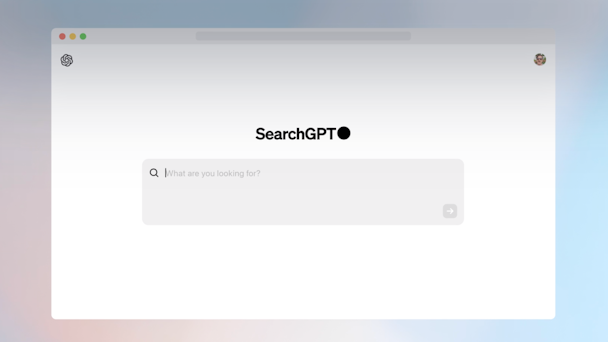OpenAI releases prototype of SearchGPT, a generative AI-powered search tool
The company says that its new experimental search engine will help publishers engage with their audiences.

SearchGPT is designed to bring a more conversational approach to online search. / OpenAI
OpenAI has launched a prototype of SearchGPT, a new product that blends generative AI with online search.
SearchGPT is intended to provide up-to-date information while simultaneously referring users to relevant sources – all through a text interface that leverages the same kind of natural language communication familiar to users of ChatGPT.
“Getting answers on the web can take a lot of effort, often requiring multiple attempts to get relevant results,” OpenAI wrote in a blog post published this afternoon. “We believe that by enhancing the conversational capabilities of our models with real-time information from the web, finding what you’re looking for can be faster and easier.”
The news of the prototype’s release arrives at a time of growing uneasiness for publishers, as generative AI-powered tools like Google’s AI Overviews and ChatGPT threaten to divert web traffic.
Explore frequently asked questions
OpenAI, which has inked content licensing deals with a number of major digital media companies, is positioning SearchGPT as a boon to the publishing industry.
”SearchGPT is designed to help users connect with publishers by prominently citing and linking to them in searches,” the company wrote. “Responses have clear, in-line, named attribution and links so users know where information is coming from and can quickly engage with even more results in a sidebar with source links.”
Advertisement
The company is testing the new tool with publishers and promised to take their feedback into consideration.
Publishers will be able to “manage how they appear in SearchGPT,” according to the blog post – though no specific details about what this might look like were provided. Publisher sites will appear in SearchGPT search results even if the publisher has opted out of having their websites crawled by OpenAI’s bot.
Advertisement
The functionality of SearchGPT appears to closely resemble that of Perplexity, a generative AI-powered search engine that’s been touted as a potential challenger to Google’s long-running dominance in online search.
If OpenAI intends to become a viable competitor to Google in the online search space, it will likely take some time, according to Damian Rollison, director of market insights at marketing platform Soci. “The early results of Bing search integrated into ChatGPT have been shaky, and the incredibly complex requirements of maintaining a world-class search platform tap into areas of expertise where OpenAI has yet to demonstrate its capabilities,“ he says. “The success of SearchGPT will probably hinge on its bringing a different approach to the search experience that users find truly refreshing and new.”
OpenAI says it will be collecting feedback from early users of SearchGPT and will eventually integrate “the best of the experience“ into its flagship product, ChatGPT.
For more on the latest happenings in AI, web3 and other cutting-edge technologies, sign up for The Emerging Tech Briefing newsletter.
